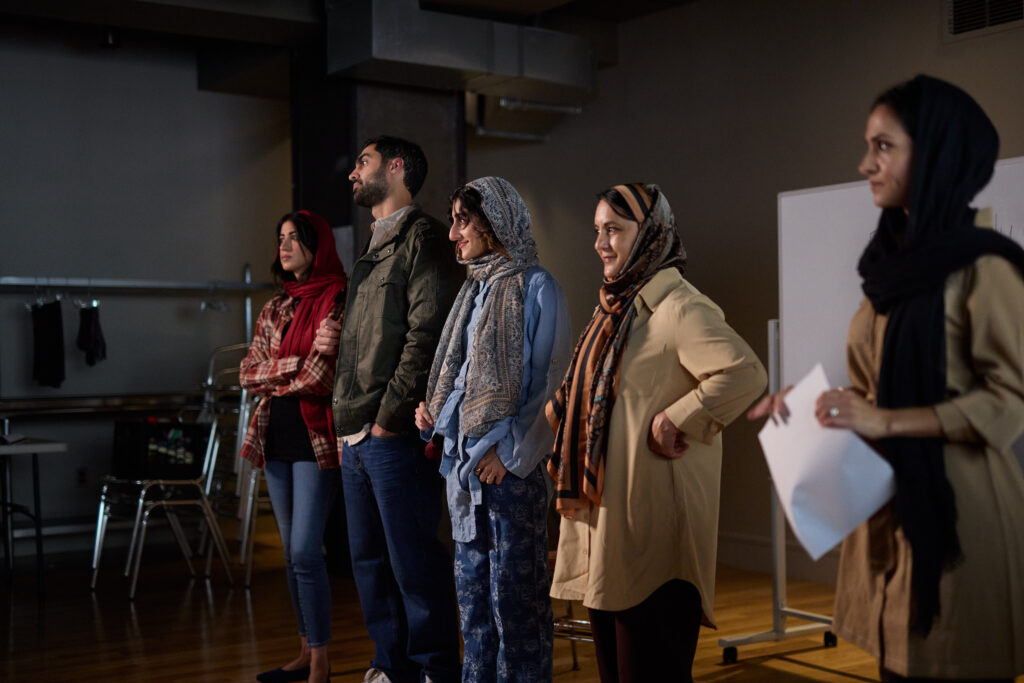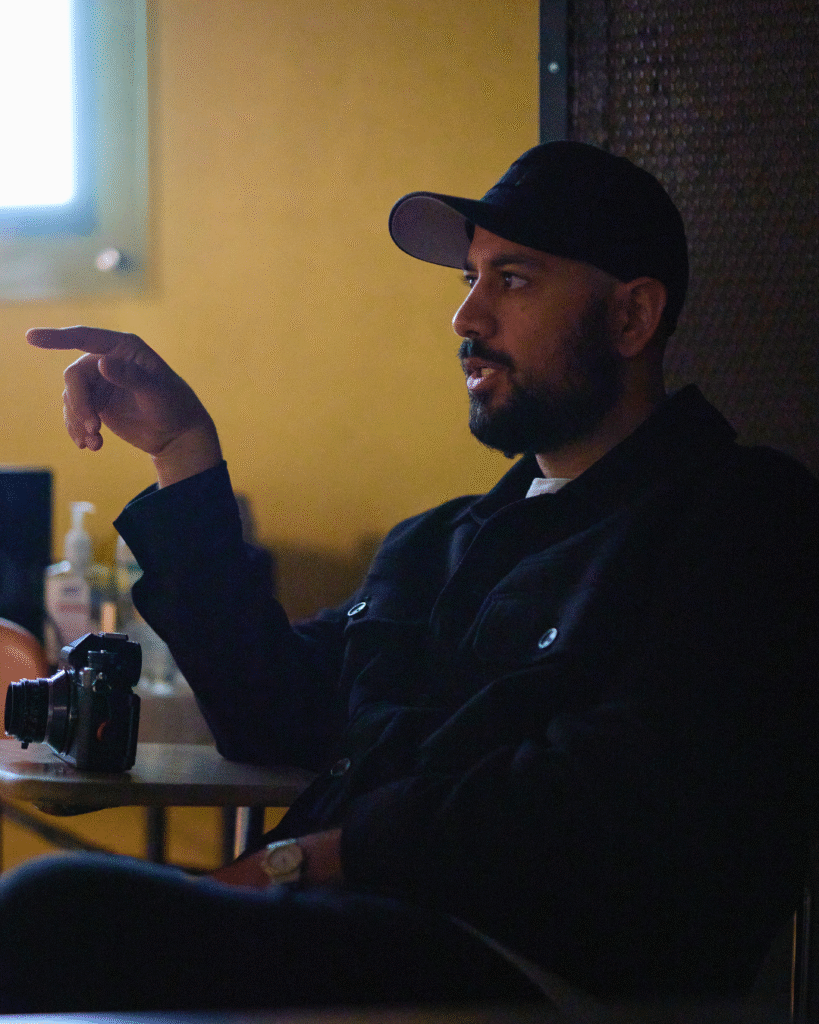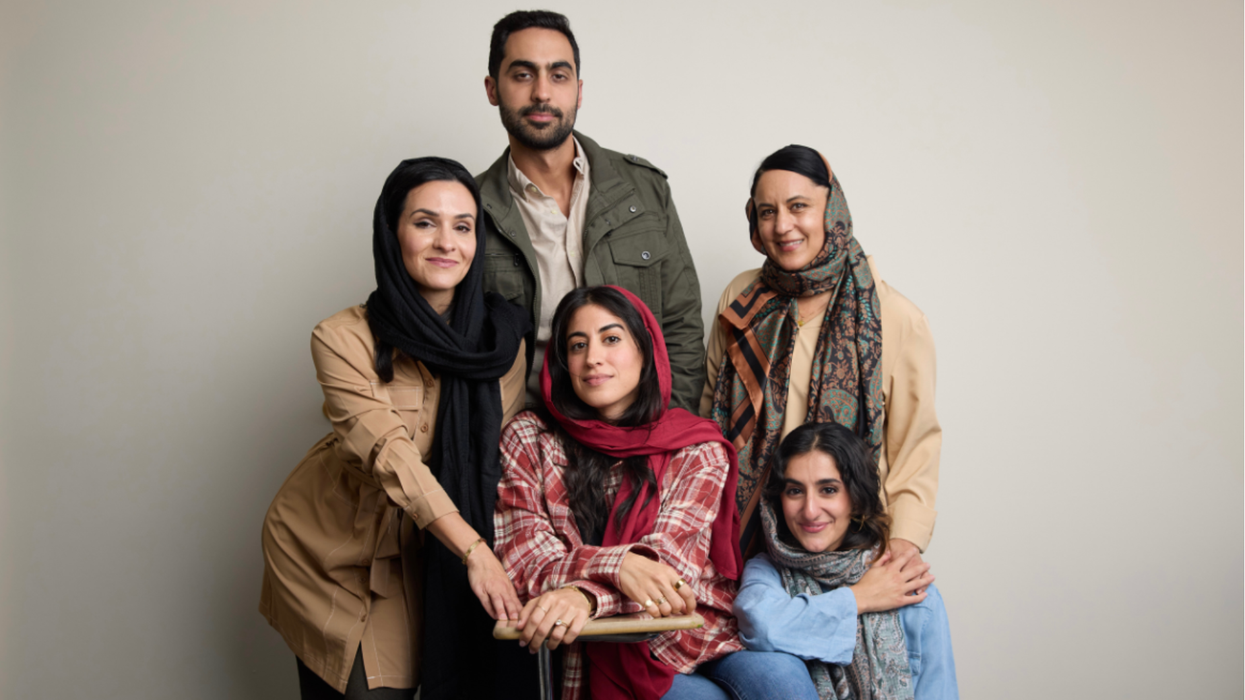This autumn, class is in session. TheaterWorks Hartford celebrates its 40th season with the Pulitzer Prize-winning play, “English” by Sanaz Toossi.
This heartfelt, timely piece is a co-production between TWH and Long Wharf Theater. “English” premieres in Hartford on Oct. 2 and runs through Nov. 2, 2025—before showcasing on Southern Connecticut State University’s campus in January 2026.
Audiences are transported to a classroom in Karaj, Iran, in 2008—where a group of four adults prepare to take the TOEFL (Test of English as a Foreign Language). The class’s mantra is “English Only,” which, of course, isn’t followed all the time. The play centers on these individuals and their personal reasons for needing a good test score.
“English…is a precise study of language’s significance,” stated The Guardian’s review in January 2025. “The 2023 Pulitzer prize winner slyly presents as a comedy about studying a foreign language, but eventually blooms into an evocation of grief and assimilation.”
Iranian-American Director Arya Shahi shared that an essential theme of the performance is how language influences identity, growth, and belonging.
“It is a story that is so much bigger than just one demographic…” Shahi told CT Latino News. “It is a story that applies to anybody that has ever tried to be bilingual…it speaks so beautifully to how our words are like our verbal DNA.”
Shahi highlighted how Sanaz Toossi portrays the people in “English”; how important it is that she shares the stories of five unique, complex, messy people.
He said, especially in the narrative world and in stories of underrepresented communities, there’s a tendency to clean characters up. There’s an expectation of making people “to be perfect others and representatives.”
Shahi added, “What I love about a piece like this is that it does not mention the politics of Iran once. It does not mention the stories that I thought we had to tell as Iranians.”
Instead, Sanaz Toossi tells “the story of people having to learn language, and the reasons why they’re learning the language slowly bleed into the plot. Those reasons are very personal, and they are very rooted in what these people want for their lives, which I think is the exact way you need to create a piece of art that engenders empathy rather than something that feels like advocacy or feels overtly political,” said Shahi.

Photo by Julian Barlow.
In 2023, when Shahi first heard news of “English” winning a Pulitzer, he was in rehearsal for Water for Elephants. Despite not knowing playwright Sanaz Toossi or having a chance to read the play yet—he stepped into another room and, overcome with emotion, cried for a moment.
“It was just this really powerful feeling,” Shahi shared—adding that, since he was a kid, he never thought he would see such celebration or esteem over this kind of Iranian representation. “That’s when the play entered my consciousness and my emotional system.”
Soon after, Shahi was asked by The Old Globe, where he had previously worked on a few productions, to direct “English”. He immediately said yes.
“I think I just realized that this story has a long life,” Shahi explained. “There is still so much to learn from the text. I think it’s one of the Great American Plays and I don’t say that lightly.”

Photo by Julian Barlow.
Shahi expressed excitement about directing “English” at TWH and collaborating with an entirely new cast and crew for this production. He shared that there was a moment, in rehearsal, when two actors realized how their own assumptions about the characters they were playing were changing.
“I think there are so many interpretations of these characters that could ring true, that the job of what we’re doing here in Hartford, what the job of the creative team is, is to create our version that feels the trustest extension of the people that are involved in this production,” said Shahi.
On the topic of ethnicity and nationality pertaining to the play’s cast and crew, Shahi emphasized that it’s most important to him that his team creates “a synthesis of diverse viewpoints,” and that’s solely possible when team members can bring their unique backgrounds, identities, and experiences into the production.
“Hopefully, as a director, we can create a space where everyone feels like we are being stretched and they are contributing,” said Shahi. With that said, Shahi is working with a mostly Iranian team—the first time he’s ever worked with this many Iranian individuals on a creative team before.
Shahi also spoke about the play’s creative and stunning score by Iranian sound designer and composer Bahar Royaee.
“I think the sound design in this production is absolutely, weirdly, one of the most unique things about this production,” said Shahi, who’s a musician himself. “It’s really rooted in that question, ‘As you’re trying to become something else, what happens to the old thing?’ And I am so fascinated by how we can synthesize and distort classic Iranian instruments to sound unidentifiable.”
The “English” cast includes: Neagheen Homaifar, starring as Marjan; Sahar Milani as Elham; Afsheen Misaghi as Omid; Pantea Ommi as Roya; and Anahita Monfared as Goli. The crew includes: Sadra Tehrani on set design, Dina El-Aziz on costume design, Mary Ellen Stebbins on lighting design, Bahar Royaee on sound design, and Gregory Jafari Van Acker as the casting director.
Learn more about the performance and purchase tickets at twhartford.org or by calling the box office at 860-527-7838. Tickets range from $25 to $70. The show runs for approximately 100 minutes with no intermission.
Belén Dumont is a freelance reporter and associate editor at The Fulcrum.
TheaterWorks Hartford Presents “English”: A Deep Dive Into Language, Culture, and Identity was originally published by CT Latino News and is republished with permission.




















